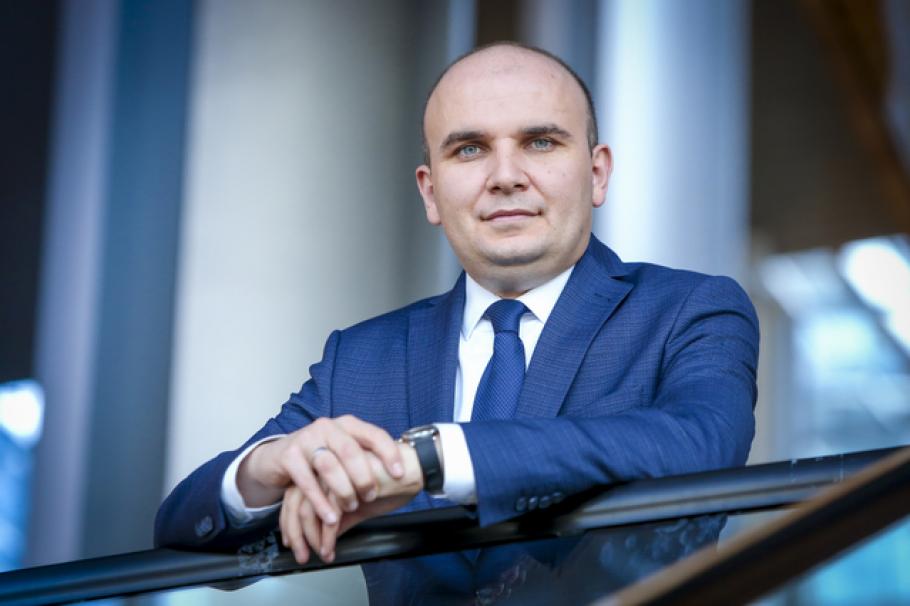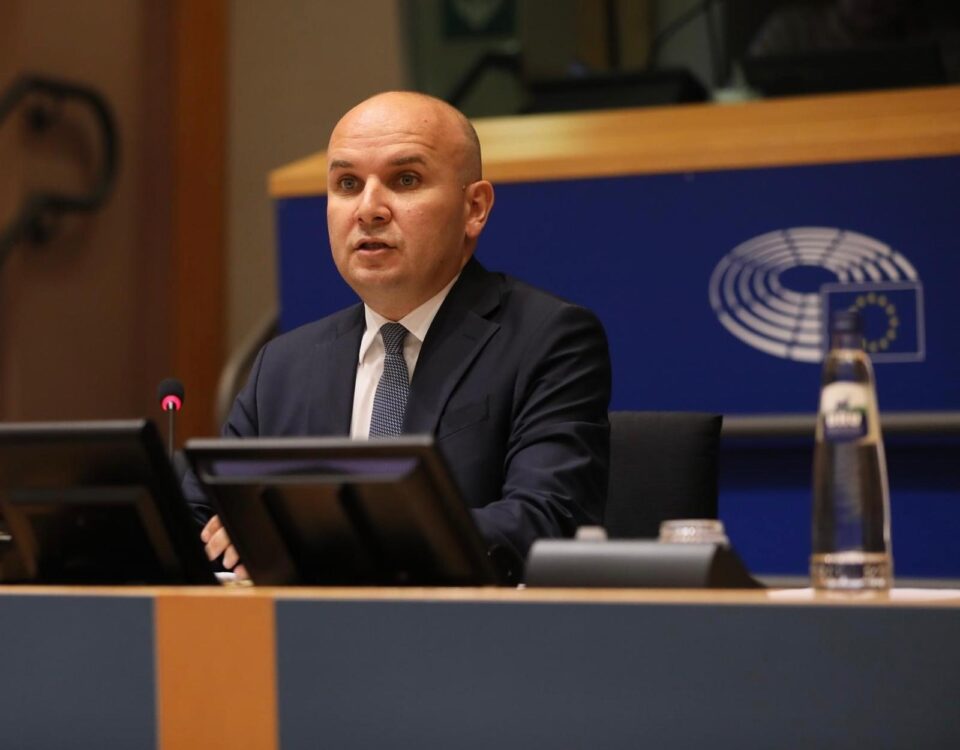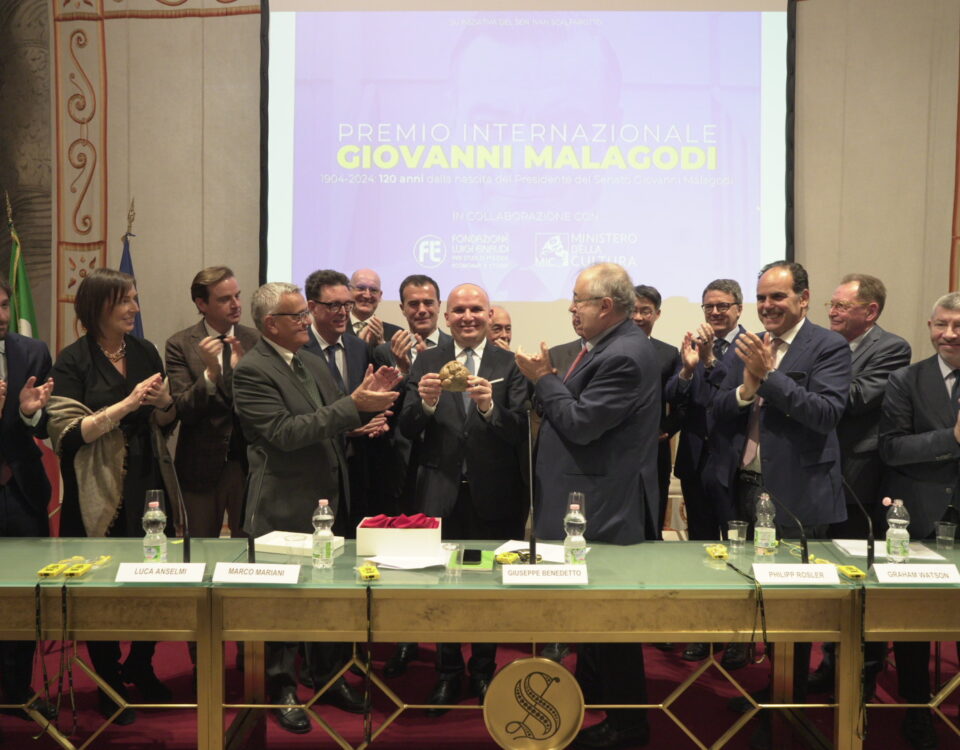
Ilhan Kyuchyuk was elected for Vice-president of the European liberals with the most votes
November 27, 2019
The Foreign Ministry of Azerbaijan awarded Ilhan Kyuchuk with an honourary medal
December 16, 2019How much longer is the EU going to present an encouraging view of the situation and at the same time remain passive regarding the region? Continuing this policy of positive messages without corresponding action will only contribute to a further deterioration of sentiments towards the EU and will discourage people who are truly pro-European, says Ilhan Kyuchyuk, ALDE Party Vice-President, MEP from Renew Europe Group, in an interview to Europost.
Mr Kyuchyuk, you are the European Parliament’s new standing rapporteur on North Macedonia. What will be the priorities of your term?
In the EU enlargement debate, it is often noted that the countries in the Western Balkans need to be provided with a “credible enlargement perspective”. Guided by this principle, I will evaluate the political, economic and social development of the country on the basis of the Copenhagen criteria. I will be completely unbiased in forming my opinion, basing it on tangible results. We have a lot of work ahead of us in the coming years. North Macedonia has laid a good foundation by carrying out crucial reforms with a view to its EU accession. The country made difficult compromises, demonstrating political courage and vision in the name of good neighbourly relations, proving on numerous occasions that it belongs in the European fold.
How do you view the fact that, at its last meeting, the European Council once again failed to reach a consensus and greenlight the launch of accession talks with North Macedonia, even though the country meets the criteria?
The European Union needs to tackle two major challenges in the next five years – integration and enlargement. On the one hand, we will be seeking a solution to the integration issue within the EU and to what extent it should be deepened, especially in the context of Brexit. For the first time in the European project’s history, we have a Member State leaving and that is an immense loss for all of us, posing the fundamental question: “How should we go forward together?” I understand the concerns of some states, and I share their call for the EU to urgently reform from the inside, but I do not agree with the idea that such reform should be done at the expense of the enlargement process. I believe that we can make great strides in both areas simultaneously. We can no longer afford to pursue a policy of empty promises and keep the Western Balkans in the backyard of the EU. The region is under tremendous external pressure, and when talking about North Macedonia, we have to admit that the European leaders have failed to deliver on their promise to the country, made contingent on it solving its name dispute with Greece. I believe that they will reconsider this strategic mistake very soon and not hide behind the need to rethink the entire accession process – a proposition that I do not deny but that is also far from well-defined by concrete methodology and deadlines.
You often visit the region. How are the people there taking the indecisiveness in the EU position, as expressed by the Council, which is diametrically opposed to the stand of the Commission and the Parliament?
The truth is that the EU’s popularity, or at least people’s confidence in the Western Balkans joining the bloc in the foreseeable future, is starting to wane. This trend is made apparent by the increasingly anti-European rhetoric of local politicians. A direct consequence from the European indecisiveness when it comes to the enlargement process is the rising influence of other global powers in the region. And even though all of us here in Brussels and in Member States acknowledge that fact, it seems that we are not really aware of the scope of the problem and the dangers it entails. The effects of our actions, or inaction, are largely magnified in the countries of the Eastern Partnership, some of which also have aspirations for membership or at least deeper integration with the EU. The disappointment from the Council decision is not limited to the political elites of North Macedonia and Albania, but reverberates more widely.
EP President David Sassoli visited Skopje a week ago and urged the people there not to give up hope and stay on the European track. How much longer can local citizens’ faith run on pure narrative?
Joining the EU should be a national cause and not the goal of one political party or another, and that applies to every country pursuing the European dream. This requires that all politicians and civil society alike set aside their differences and focus on the main objective. Despite the historical legacy, the conflicts and the ethnical tension, the countries in the Western Balkans have managed, with some small exceptions, to achieve the necessary national consensus putting them on the European track. And here comes the big question: How much longer is the EU going to present an encouraging view of the situation and at the same time remain passive regarding the region? Continuing this policy of positive messages without corresponding action will only contribute to a further deterioration of sentiments towards the EU and will discourage people who are truly pro-European. Just remember Bulgaria in the 1990s and imagine how it would have looked today if there had not been a clear roadmap laid out by the EU. Our country was ultimately able to realise its most significant foreign policy achievements in 2004 and 2007. What is the roadmap for the Western Balkans today?
How fair is it to describe Parliament as an important player in the enlargement process, considering that there are Member States disregarding its resolutions?
The Parliament and the Commission expressed categorical and unequivocal support for the enlargement policy. The European Council, however, had a different view despite the overwhelming majority of countries in favour of launching accession negotiations with North Macedonia and Albania. We are riding an institutional carousel made up of the Commission, the Parliament and the Council, and this makes it increasingly difficult to arrive at a compromise due to the unanimous decision-making system in the Council. This clash of institutions is not working to the benefit of Europe and its citizens. We urgently need for the Council to be reformed. Decisions regarding matters of foreign policy and defence should be made via qualified majority and not unanimity. Only then will we be able to achieve the necessary institutional homogeneity.
French President Emanuel Macron is the person who urged to turn down the proposal for starting accession negotiations with North Macedonia. He also insists on more stringent accession rules. How correct are the speculations voiced by some observers that his real goal is to shut the EU doors for the Western Balkans for a long period of time?
This month we celebrate the 30th anniversary of the Berlin Wall’s fall and the onset of democracy in Eastern Europe. During that period, both the European and the US leaders have arrived at the conclusion that the enlargement of the European project to the east is of key importance for peace and prosperity in Europe. The fundamental argument was that there were no issues on the European continent which could not be resolved if addressed properly and committedly. However, this long-term perspective has apparently changed as a result of the internal difficulties within the EU. The decision to block the EU accession process for Albania and North Macedonia marked the symbolic end of the period which started after 1989. Today, many people criticise the accession procedure for its too many bureaucratic and obscure criteria. Opinion prevails that there is a need for additional support in setting the interim priorities, for amendment of the Copenhagen criteria, and for devising the optimum methods for the implementation of a successful accession process. In many respects this phrase substitutes the question whether the accession process, as an instrument in its present form, works and yields feasible results. I think that the EU needs adaptation and improvements in order to ensure clarity, support and realistic perspectives. However, how would this change of criteria look like? How would it be implemented? Will it affect the countries which have already started the accession negotiations, like Serbia and Montenegro? Before the EU-Western Balkans summit in Zagreb, these three institutions must have a consolidated and unambivalent position on this issue. The Western Balkans cannot remain in the EU’s waiting room, the region must be an integral part of this very Union.
How would you comment on the allegations aired in some Western media that Macron is set to propose to the Western Balkan countries to become members of the European Economic Area, which de facto will forever bar them from the EU political institutions?
At this stage such allegations sound rather like rumours, but EEA membership will for sure yield positive results without damping the European integration aspirations of these countries. One of the challenges that EU faces is outlining before the counties which aspire to become EU members the logical steps in the process of transforming their economies and societies in a way that will enable them to improve the quality of life for their citizens. The rule of law is of paramount importance for the success of the accession process. It would be a guarantee not only for well-functioning institutions but would also open doors to foreign investments in the candidate states. Currently, the economic gap between the European Union and the Western Balkan states is huge, and this is one of the key reasons why this region is seen in a negative light. What we need is tangible assistance, financial and expert support, which will narrow the gap between our economies and give more confidence to business. The economies of the Western Balkans have to be integrated into the EU common market and pursue European goals. Only then the economic growth, so essential for these states, will be guaranteed.
Do you believe that the new leadership of the EU must set its own foreign policy rules?
If the EU really wants to be a global actor, it has to pursue consistent and long-term foreign policy based on common interests. Worldwide the situation is very dynamic, and the geopolitical puzzle is being rearranged every day. This requires us not only to quickly adapt but also speak with one voice. When Ms von der Leyen outlined her priorities, she said that she will chair the Geopolitical EU Commission that will adapt the EU to the changing world and also make our ideas work at a global level. We are still to get acquainted with the details of this concept, and I would like to see how it will fit into the two policies of enlargement and good neighbourly relations.
If North Macedonia joins the EU after all, would you agree that it should be subjected to monitoring as regards the rule of law – something that proved to be a weapon for political attacks against Bulgaria and Romania, and an obstacle for their Schengen accession rather than a case of real cooperation?
The values enshrined in Art. 2 of TEU, such as observance of the principles of democracy, equality, rule of law, are fundamental for the European Union, and this is exactly the reason why they are also among the key Copenhagen accession criteria. Three years ago, the European Parliament approved the report of our colleague Sophie in ‘t Veld concerning launching the EU Pact on democracy, rule of law and fundamental human rights. The proposal was based on the unanimous opinion that the existing instruments pertaining to the functioning of the principles of democracy in the EU, one of which is the Cooperation and Verification Mechanism, are limited in their scope. This makes them inadequate and ineffective as there is no universal and integral mechanism for systematic monitoring of all Member States, on equal footing. The European Commission also arrived at this conclusion when in July of the current year published an ad hoc communique regarding the action plan for strengthening the rule of law and proposed the review cycle for the principles of the rule of law, including an annual report on the supremacy of law for all Member States.
With this in view, the proposal of the Commission for scrapping the Cooperation and Verification Mechanism for Bulgaria sounded logical. That is why I will for sure oppose special monitoring. I think it is necessary to raise a voice against the double standards and the different approaches towards different Member States, instead of introducing new instruments in a piecemeal fashion. A mechanism which was applied to only two of the Member States, while it was spared on the older EU members, as well as on Croatia which joined the Union later, is discriminatory in its essence. More than that, time and again, the Cooperation and Verification Mechanism has been bound with Bulgaria’s and Romania’s Schengen membership, despite the calls – by the European Commission itself – to not bind the two issues together.
Close-up
Ilhan Kyuchyuk is a Bulgarian member of the European Parliament from the group of Renew Europe/Movement for Rights and Freedoms. Having served as Vice-President of the ALDE Party since 2015, he was re-elected for a 3rd time to the position on 26 October 2019. Mr Kyuchyuk is a member of the Committee on Foreign Affairs and of the Delegation to the EU-Turkey Joint Parliamentary Committee, as well as a substitute member of the Committee on Transport and Tourism, and of the Delegation for relations with the Arab Peninsula. Since November 2014, Mr Kyuchyuk has been a member of the Human Rights Committee of the Liberal International, and since May 2015 he has been ambassador of the European Entrepreneurship Education Network. He has been a member of the Youth Movement for Rights and Freedoms since 2005 and in November 2012 he became its president. Two weeks ago, Ilhan Kyuchyuk was chosen as the EP’s next standing rapporteur on North Macedonia.




